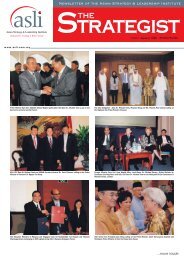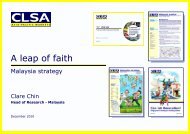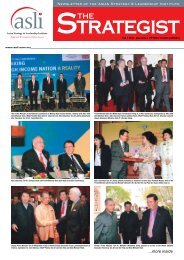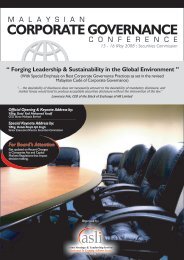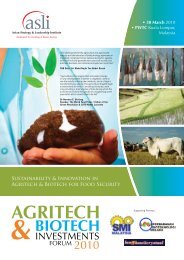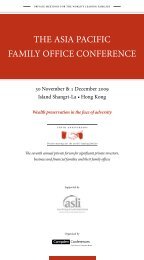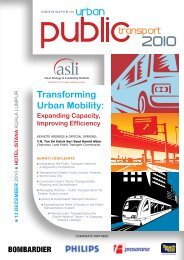This is a report of the proceedings of - Asian Strategy & Leadership ...
This is a report of the proceedings of - Asian Strategy & Leadership ...
This is a report of the proceedings of - Asian Strategy & Leadership ...
- No tags were found...
You also want an ePaper? Increase the reach of your titles
YUMPU automatically turns print PDFs into web optimized ePapers that Google loves.
THE ASIA THINK TANK DIALOGUE REPORTRebuilding Confidence, Restoring Livelihoods Session Two 23Case Studies – Sharing <strong>of</strong> Country Experiences andPerspectives on How Rural Development & PovertyEradication Programmes Have SucceededDr. Josef T. YapPresident, Philippines Institute for Development StudiesManila.Sustainable economic development was stillan elusive concept in <strong>the</strong> Philippines. Lookinginto per capita GDP growth over <strong>the</strong> past50 years, <strong>the</strong> Philippines had lagged behindits neighbours in poverty reduction, with its absolutepoverty incidence <strong>of</strong> USD1 a day representing 13.2per cent <strong>of</strong> <strong>the</strong> population as compared to Viet Nam’s8.4 per cent. Dr. Yap noted that <strong>the</strong> Philippines hada long way to go to address th<strong>is</strong>. Noting that povertyin <strong>the</strong> Philippines was largely a rural problem, andgiven its overwhelming numerical importance, povertyprogrammes had to be concentrated in <strong>the</strong> ruralareas. Thus far, he said, <strong>the</strong>re had been very littleprogress made by <strong>the</strong> Government. Besides <strong>the</strong>adequacy <strong>of</strong> programmes and resources, targetingwas also poor as most developmental efforts wereconcentrated in Manila. More importantly, localgovernment agencies were not fully equipped totackle poverty-reduction programmes. At <strong>the</strong> heart <strong>of</strong><strong>the</strong> problem, baseline data at <strong>the</strong> local level was notyet credible and <strong>the</strong>re was a need for nationalaggregated data. At <strong>the</strong> provincial, municipality andtown levels, <strong>the</strong> data was incomplete to ensure abetter understanding <strong>of</strong> <strong>the</strong> problems at hand.He described <strong>the</strong> Micro Economic Impact <strong>of</strong> MicroPolicies, a community-based monitoring system(CBMS), as a way out as it addressed <strong>the</strong> gaps indata and diagnosed poverty at <strong>the</strong> micro levelby identifying eligible beneficiaries, policies andprogrammes. He said it was more than a data-collectingsystem as it also intended to promote evidence-baseddec<strong>is</strong>ion-making. It was a tool to support <strong>the</strong> dec<strong>is</strong>ionmakingprocess by providing local government unitswith <strong>the</strong> means to promote better governance.There was, however, some res<strong>is</strong>tance to <strong>the</strong> projectbecause local politicians did not want <strong>the</strong> public toknow whe<strong>the</strong>r progress had or had not beenachieved.‘Sustainable economicdevelopment <strong>is</strong> still an elusiveconcept in <strong>the</strong> Philippines.We have lagged behind ourneighbours in poverty reduction’Dr. Josef T YapDr. Yap explained that <strong>the</strong>re were 14 indicators undervarious headings such as education under <strong>the</strong> CBMS.It had been streamlined to make it more effective.CBMS tabbed on local governance and its data hadbeen drawn upon for human development <strong>report</strong>sand by NGOs for resource pr<strong>of</strong>iling. Major lessonslearnt from <strong>the</strong> implementation <strong>of</strong> CBMS over <strong>the</strong>past nine years were many and <strong>the</strong>y included <strong>the</strong>need for a local poverty monitoring system to ensureefficient assessment <strong>of</strong> impact from Poverty ReductionStrategies. It was also important to work with localgovernments and convince <strong>the</strong>m <strong>of</strong> <strong>the</strong> importance <strong>of</strong>CBMS to ensure its sustainability. He found that politicalscions were progressive and hence more open to <strong>the</strong>concept <strong>of</strong> CBMS. While it was moving forward, it wasnot progressing as fast as he had hoped. Never<strong>the</strong>less,a good beginning had been made to make sense <strong>of</strong>what poverty meant and what could be done in amuch more systematic and rational manner.




